Driving the future of genomics through deep-tech breakthroughs.
Email us
Deep-tech innovation meets biological intelligence we're unlocking the code of life.

Pioneering the next generation of genomics through science, code, and compassion.
We are more than just a company; we're a collective of visionary minds driven by a singular purpose. Comprised of seasoned scientists, medical professionals, business leaders, and innovative coders, our team is united by a shared passion for advancing the frontiers of science and technology.
At DataHelixTM AI, we stand at the forefront of innovation in genomics. With a relentless pursuit of excellence, we're pioneering the next generation of genetic solutions, making breakthroughs that redefine what's possible. DataHelixTM AI
Our mission is clear: to democratize genomics for everyone. By revolutionizing accessibility, quality, and speed, we are reshaping the landscape of genetic research and application.
Every day, we embark on this journey with unwavering dedication, striving to realize our vision of #GenomicsForAll. Together, we decode the intricacies of life, paving the way for a brighter, healthier future.

Our team of highly qualified PhD experts can help guide your genomics or sequencing journey from experiment design to data interpretation and publication ready insights.

We offer rapid and highly accurate NGS based diagnostic products for infectious diseases. Our solutions support early detection, resistance profiling, and public health surveillance.

We have developed innovative NGS based tools in oncology to enable precision diagnostics and monitor treatment response with high accuracy and low invasiveness.

The Onco-Microbiome refers to the complex relationship between the human microbiome (the trillions of microbes living in and on the body) and cancer development, progression, and treatment outcomes.

Transplant Genomics is the use of advanced genomic technologies to monitor, predict, and improve outcomes after organ or stem cell transplantation. It focuses on identifying genetic and molecular changes that signal how the body is responding to a transplant particularly to detect graft rejection, immune complications, or relapse early and accurately.

Familial Hypercholesterolemia (FH) is a genetic disorder that causes very high levels of LDL cholesterol ("bad cholesterol") in the blood from an early age. If left undiagnosed or untreated, it significantly increases the risk of early heart disease, including heart attacks, even in young adults or children.

Rare diseases (also known as orphan diseases) are medical conditions that affect a small percentage of the population, often fewer than 1 in 2,000 people. Though each rare disease is uncommon, there are over 7,000 known rare diseases, collectively affecting millions of people worldwide